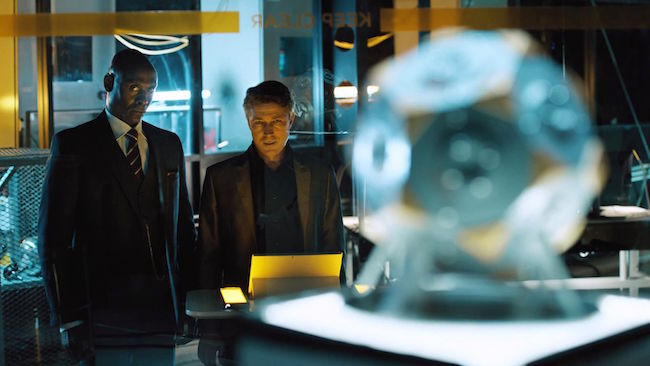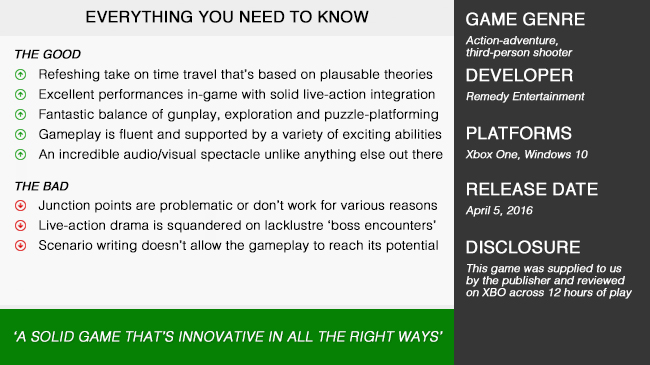
Like many fans of Remedy Entertainment, I’ve been anticipating the release of Quantum Break for more than half a decade now; although, that’s not exactly surprising given the company’s track record when it comes to development time. Unlike with Alan Wake (the studio’s previous title), however, I’ve also spent most of the past six years confused by what exactly this game was hoping to be. Live action components, major casting changes, and gameplay footage that was unclear on how it actually played left me feeling conflicted all the way until launch. I’m usually pretty good at picking games early, but I honestly couldn’t tell whether it was going to be absolutely incredible to play or a total mess.

Not unlike its spiritual predecessors, Quantum Break is a story-driven third-person shooter—although, with a much more prominent live-action component this time around. Basically, the game is split up into five acts, with the live-action ‘TV Show’ comfortably slotting in between each one. It was all straightforward (to my surprise), and it worked much better than I anticipated. Despite all this, though, I still ended up getting off to a rough start and walked away from the first act with mixed feelings. Not only were some gameplay fundamentals a little unclear at first, but I also had serious concerns about how the dynamic component of the story would work in conjunction with the overarching plot.
Let’s start with the premise, though. The game opens with protagonist, Jack Joyce (Shawn Ashmore), being called to Riverport University to assist his best friend, Paul Serene (Aidan Gillen), with a rather sensitive time travel experiment. Apparently Jack’s brilliant yet deranged brother, William Joyce (Dominic Monaghan), walked out on him and there was no one else he could trust. I enjoyed the opening in particular because it included plenty of breathing room and lots of great character exposition. However, unsurprisingly, the experiment goes horribly wrong; leaving Jack on the run from an organisation known as Monarch, which is headed by the same friend he was just trying to help, only 17 years older.

As a result of the experiment gone wrong, both Jack and Paul inherit special time-based powers; with Jack receiving a set of ‘weaponised’ abilities while Paul can see various possible futures and manipulate the outcome. Between each act there are scenarios called “junctions,” in which the player takes control of Paul to make a critical decision that will directly impact the plot of the game as well as the live-action show. It sounds like a neat idea, but early on it just feels wrong role-playing a character whose intentions you barely understand. And even once you’re able to empathise with Paul, new issues arise such as having access to information he couldn’t possibly know; devaluing the whole process.
One thing about the writing which I can’t praise enough, though, is how well the entire concept of time travel has been handled. As far as good ‘Sci-Fi’ in video games goes, this is certainly one of the best examples there is; with plausible scientific theory supporting all the components. I also have to commend the acting, because whether you’re in-game or watching the live-action show, it’s consistent and supported by a likeable cast. It is worth noting, however, that it’s important to take the time to listen to audio diaries as well as scour the environment for additional backstory. It’s easy to track what you uncover, and it will help you to more fully understand what is mostly an interesting, well-written story.

Side-stepping my issues with how the junction points are not always executed well, I have to admit I was impressed with how the consequences of your choices impacted the finer details of the plot. Quantum Break has plenty of replay value, not only in how the game itself plays out but also the live-action show—which was created to have the player to empathise with another side of the conflict. It worked better than expected, and the production value is generally good (though there are a few budget special effects). I was also impressed with how well the two crossed over visually as the game rarely falls into the realm of the uncanny valley—except for maybe Martin Hatch (Lance Reddek) sometimes.
One of the reasons Quantum Break and I got off on the wrong foot is because it’s easy to assume it plays like a cover shooter. This is definitely not the case, and any attempt to play as such will end in frustration given its use of auto-cover and the absence of a crouch or dodge option. From the previews, it wouldn’t be unreasonable to assume the gameplay could get a bit messy or overly-complicated (with all those time-based abilities tearing up the environment), but that’s not the case. I was absolutely blown away by how simple it was to play, as the core gameplay is heavily focused on utilising your abilities to traverse the environment and fight enemies while still offering a moderate difficulty.

While I was a big fan of Alan Wake and what it tried to accomplish in terms of storytelling, my biggest issue with the gameplay was that there was simply too much ‘shoot all the dudes to progress’ mentality. As a result, the game had a tendency to become a bit suffocating at times, so I’m relieved Remedy learned from these past mistakes to make Quantum Break a much more balanced game in terms of exploration versus gunplay. Jack Joyce basically has Lara Croft’s ‘survival instincts’ (although it fits better narratively here), which allows players to track enemy movement, pick out weapons/ammo or hunt for chronon sources—which you’ll collect and use to upgrade your time-based abilities.
The most honest way I would describe the gunplay in Quantum Break is that it never quite makes it past third gear. It will often push hard and go fast (the powers are great!), but it also leaves you with the feeling it could go just that bit further. It’s certainly memorable, though; filled with visual spectacles unlike any other game, as well as unique combat far removed from the usual grind. It’s just that there aren’t enough climaxes to cap it off. Personally, I felt the purpose of the live-action show was to have us empathise with key characters before forcing us to face off against them. I got heavily invested too, but all the major cross-over points in-game never capture the drama it worked so hard to set up.

Regardless of what platform you choose to play it on, Quantum Break is going to look visually stunning. The way in which time freezes and how you interact with the environment is something else, and while the puzzle-platforming isn’t anything groundbreaking or overly challenging, it does add another layer of spectacle on top of the already enjoyable gameplay. Time travel isn’t exactly a new concept, but the way it’s handled here, both narratively and visually, is truly excellent. Some of the powers at your fingertips include the ability to freeze time in a focused area, run while time is frozen, form a protective bubble that can deflect bullets, or break time in a focused area for serious destructive results.
I’m a big fan of all the little stylistic touches, such as how your actions during combat alter the music in real-time, or the way enemies instantly freeze mid-air after being disabled. It’s clear a lot of care went into making Quantum Break as immersive as possible, and Remedy deserves the highest praises for their efforts as it looks great apart from the odd graphical hiccup. It’s also the sort of risky single-player centric experience I think the industry needed right now (despite its shortcomings). The reality is that not everything will work out in a highly ambitious game, but that doesn’t mean it’s any less deserving of praise than a polished game that’s close on to flawless but doesn’t offer anything new.

Quantum Break is a game I think a lot of people are going to enjoy as it’s highly innovative as well as visually unique. It also includes great performances from familiar faces, a wealth of interesting ideas and memorable gameplay that is as stylish as it is approachable. Basically, it’s everything needed to satisfy a broad demographic while still engaging more scrutinous players with a compelling science fiction narrative that’s actually based on plausible scientific theory. I have great respect for any developer that tries to do something different, even if it doesn’t always work. And yes, there are some things in Quantum Break that don’t always execute that well, but it’s hardly a deal breaker. Ultimately, it’s a solid game with good replay value, a lot of memorable moments, and is still certainly a must-play for Xbox One/PC owners.











